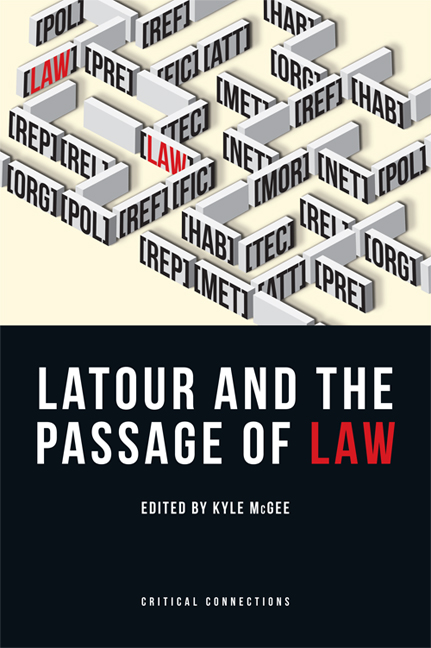Book contents
- Frontmatter
- Contents
- Introduction
- 1 From the Conseil d’État to Gaia: Bruno Latour on Law, Surfaces and Depth
- 2 Politics and Law as Latourian Modes of Existence
- 3 On Devices and Logics of Legal Sense: Toward Socio-technical Legal Analysis
- 4 ‘The Crown Wears Many Hats’: Canadian Aboriginal Law and the Black-boxing of Empire
- 5 Providing the Missing Link: Law after Latour's Passage
- 6 The Life and Deaths of a Dispute: An Inquiry into Matters of Law
- 7 Plasma! Notes on Bruno Latour's Metaphysics of Law
- 8 The Conditions of a Good Judgment: From Law to Internal Affairs Police Investigations
- 9 In The Name of the Law: Ventriloquism and Juridical Matters
- 10 Laboratory Life and the Economics of Science in Law
- 11 Bartleby, Barbarians and the Legality of Literature
- 12 The Strange Entanglement of Jurimorphs
- List of Contributors
- Index
12 - The Strange Entanglement of Jurimorphs
Published online by Cambridge University Press: 05 September 2016
- Frontmatter
- Contents
- Introduction
- 1 From the Conseil d’État to Gaia: Bruno Latour on Law, Surfaces and Depth
- 2 Politics and Law as Latourian Modes of Existence
- 3 On Devices and Logics of Legal Sense: Toward Socio-technical Legal Analysis
- 4 ‘The Crown Wears Many Hats’: Canadian Aboriginal Law and the Black-boxing of Empire
- 5 Providing the Missing Link: Law after Latour's Passage
- 6 The Life and Deaths of a Dispute: An Inquiry into Matters of Law
- 7 Plasma! Notes on Bruno Latour's Metaphysics of Law
- 8 The Conditions of a Good Judgment: From Law to Internal Affairs Police Investigations
- 9 In The Name of the Law: Ventriloquism and Juridical Matters
- 10 Laboratory Life and the Economics of Science in Law
- 11 Bartleby, Barbarians and the Legality of Literature
- 12 The Strange Entanglement of Jurimorphs
- List of Contributors
- Index
Summary
Since I have had the privilege of reading all the chapters of this edited volume and since I don't have nearly as much experience of legal practice as most of the authors, I think it is more appropriate that I limit my piece to comments and emendations of what they themselves have done. Actually this is in keeping with my own way of pursuing the inquiry into modes of existence (AIME) that orients several of the arguments developed in those pages. So I will use the material presented in the preceding chapters to offer contributions to the inquiry in the same style and format as the many snippets I have assembled over the years and which are still being collated by coinquirers in the site www.modesofexistence.org. It is through that process of assembling multi-coloured tesserae that the mosaic begins to conjure a more or less coherent figure. By following this habit, I won't have to apologise for the disjointed nature of the following paragraphs. Let's just hope that in the end they will make some sense. (I also apologise for a wide use of the jargon of the AIME book and site to facilitate connections with the material assembled there.)
Before I really start, I want to stress how reassuring it is for me to see that it is actually the mode of existence I call [LAW] that has been so generously commented on by English speaking jurists. By the way, I fully agree with Van Dijk (p. 184) that Assignation should really be used to name the mode in question so as to avoid confusing it with the multi-faceted domain of Law, but I feel that the acronym [ASS] will create some unwanted diplomatic frictions! So far, it is the only mode where the conversation has progressed to the point of allowing a few fascinating diplomatic encounters. I am really grateful to the authors of this volume and especially to its editor, Kyle McGee. Actually I began to really believe in my own project when reading Kyle's book (2013) on how I should have studied law!
Overall, I take this volume as a confirmation of my claim that [LAW] has resisted much better than all the other modes the crushing weight imposed by an exclusively epistemological definition of what true and false really mean.
- Type
- Chapter
- Information
- Latour and the Passage of Law , pp. 331 - 353Publisher: Edinburgh University PressPrint publication year: 2015



